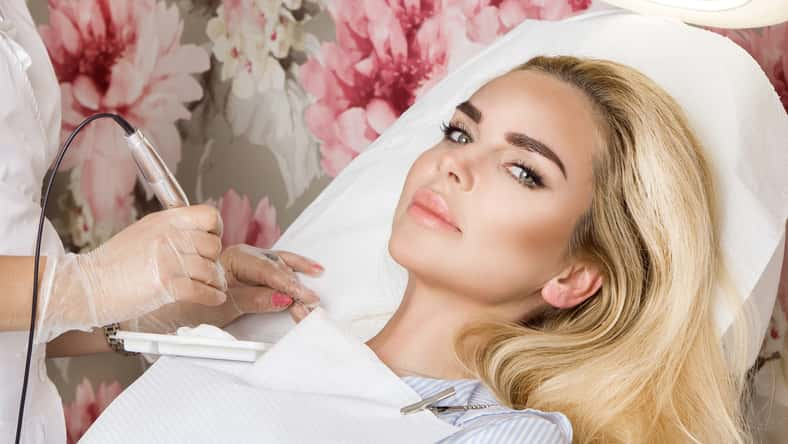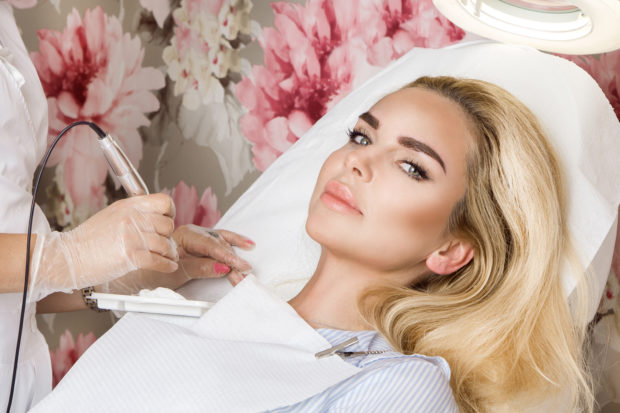Cosmetic Contour Tattoos Are Going Viral On TikTok, But Are They Really Safe?

We have all heard of microblading, or a form of semi-permanent tattoo meant to fill in eyebrows in the long term, as opposed to single-wear eyebrow pencils.
Similarly, lip blushing– or lip tattooing– has also picked up steam in recent years, allowing people to achieve a long-wearing lipstick look without needing to constantly reapply makeup products.
But did you know that you can also seek out tattoo services for an arguably much more time-consuming makeup task? More specifically, I’m talking about contouring.
A few months ago, one TikToker named Charlotte Payne went totally viral after sharing a video of herself undergoing the process.
As Charlotte relaxed in the tattoo chair, donning a white cap, her tattoo artist applied various shades of ink along specific areas of her face.
The lightest tones were applied under her eyes and down the top of her nose. Then, across Charlotte’s cheekbones and down her chin, she received a medium shade. Finally, underneath her cheekbones and at the top of her hairline, the darkest tones were applied to really deliver that cutting contour look.
According to Charlotte, the results of her specific service will last between four and six months– cutting out the arduous process of concealing, contouring, baking, and adding blush every single morning.
“So glowy, I’m obsessed,” she said of the contour after her tattoo was done.
Still, even though the thought of skipping your morning makeup routine might sound super worth it, most of Charlotte’s viewers on TikTok expressed tons of doubt. Her video gained one hundred and ten thousand likes and prompted a lot of conversation about the longevity, unpredictability, and safety of contour tattoos.

marcink3333 – stock.adobe.com – illustrative purposes only, not the actual person
“Why is no one talking about the fact that our skin changes colors during the summer, for example?” asked one commenter.
“I feel like this is riskier than when eyebrows and lips were in,” wrote another user.
“It’s not going to cause breakouts?” asked a third.
Well, according to The Society of Permanent Cosmetic Professionals, permanent cosmetic makeup– also known as cosmetic tattooing– is safe as long as proper sterilization and disinfection guidelines are adhered to. Some of these standards include the use of new and sterile needles, disposable sterilized one-time-use machine parts, and personal protective equipment such as gloves and aprons.
The average cost per procedure– which can include anything from eyebrow filling and eye lining to scar camouflage– is between four hundred and eight hundred dollars. Of course, though, more intricate or complex work could cost anywhere from one hundred and fifty to two hundred and fifty dollars per hour.
It is also important to note that although cosmetic tattoos are widely referred to as “semi-permanent” in popular media, they cannot be washed off. Instead, the organization clarified that cosmetic tattoos are permanent but will endure fading– which is why many people regard the services as a shorter-term makeup solution.
“Permanent cosmetic procedures are considered permanent because the pigment is tattooed into the upper reticular part of the dermal layer of the skin and cannot be washed off. However, as with any tattoo or colorant (pigment) in general, fading can and often does occur, requiring periodic maintenance referred to as color re-enhancement or color refreshing.”
Now, of course, there are risks to getting tattoos that cannot be avoided by best tattooing practices alone.
The most obvious is an infection, which can be caused if unsterile tattooing equipment is used– transferring infectious diseases such as hepatitis, HIV, and staph-caused skin infections. Infections can also result from contaminated tattoo inks, even if a tattoo artist has strictly followed hygienic procedures.
According to the U.S. Food and Drug Administration (FDA), those who seek cosmetic tattoos could also suffer allergic reactions, keloid formation (or scars), and granulomas. Granulomas are “nodules that may form around material that the body perceives as foreign, such as particles of tattoo pigment.”
Finally, those who get tattooed run the risk of encountering removal problems– because even with the advent of laser technology, removing a tattoo is still a long, painstaking, and expensive process.
There have also been reports of people suffering from swelling or burning after undergoing magnetic resonance imaging (MRI) and tattoo pigments interfering with MRI image quality. Despite all of these documented risks, though, many people– like Charlotte– are still opting to get cosmetic tattoos done.
“Many individuals choose to undergo tattooing in its various forms. For some, it is an aesthetic choice or an initiation rite. Some choose permanent makeup as a time saver or because they have physical difficulty applying regular, temporary makeup,” the FDA noted.
“For others, tattooing is an adjunct to reconstructive surgery, particularly of the face of breast, to simulate natural pigmentation.”
For instance, people who have lost their eyebrow hair due to alopecia may decide to have eyebrows tattooed on their skin. At the same time, those with vitiligo– or a lack of pigmentation in certain areas of the skin– might try tattooing in hopes of camouflaging the condition.
“Whatever their reason, consumers should be aware of the risks involved in order to make an informed decision,” the FDA advised.
Would you ever get a contour tattoo? What about other forms of cosmetic tattoos, like microblading or lip blushing?
To watch Charlotte’s original TikTok, visit the link here.
If true crime defines your free time, this is for you: join Chip Chick’s True Crime Tribe
Sign up for Chip Chick’s newsletter and get stories like this delivered to your inbox.
More About:Beauty & Style